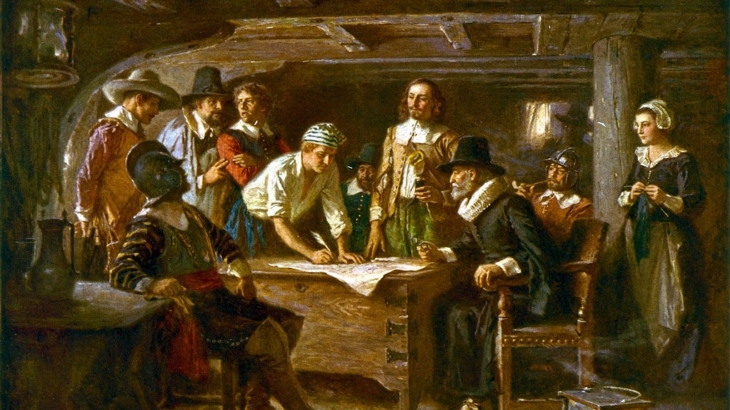Principle of a Written United States Constitution as the Supreme Law of the Land, Designed for the Preservation of Liberty
 Essay Read by Constituting America Founder, Actress Janine Turner
Essay Read by Constituting America Founder, Actress Janine Turner
The idea of a constitution is an ancient one. The idea of a written constitution, however, is relatively new. To be sure, regimes have long created written documents and legal codes that outline the structure of governing authorities and protect certain rights for citizens and subjects. Yet before the United States Constitution, these written documents were not seen as fundamental for understanding what constitutes a regime. Before Americans chose to produce written constitutions, a constitution was understood in terms of the norms that make up a regime rather than the words written on any piece of paper.
Classical political thought recognized the need to study constitutions, but a regime’s constitution was the collection of formal and informal norms that made up a people’s way of life in a regime. In Aristotle’s Politics, he describes the regime (the Greek word politeia) as “an arrangement of a city with respect to its offices, particularly the one that has authority over all matters. For what has authority in the city is everywhere the governing body, and the governing body is the regime.” In other words, the constitution of a city was not a legally-binding written document outlining the powers and restrictions on officers. Instead, the constitution was the way the people of a regime lived and how they chose to organize their governing offices at a given time. Constitutions were much less a matter of fixed law and much more a matter of a people’s organic norms. Politics was inherently contingent as a regime would change in its nature whenever the people changed in their ways and how they chose to organize authority.
All of this changed with the United States Constitution. Certainly, the idea of a written document to serve as the fundamental law of government did not spring from the mind of James Madison in 1787 without any antecedents. Early settlers of the American colonies wrote documents outlining the governing principles for their new settlements, such as the Pilgrims’ Mayflower Compact. The idea of a model constitution for a regime had been developing in modern political thought, such as in John Locke’s Second Treatise of Government. During the American Revolution, states began writing new constitutions even before the Declaration of Independence was published. The Continental Congress passed the Articles of Confederation as the first written constitution for the United States. The document produced by the Constitutional Convention in 1787 to correct the defects of the Articles, which was then ratified by the American people, was the culmination of these efforts.
The shift in thinking on the importance of a written United States Constitution cannot be understated. The implicit idea was that a written document outlining the new government’s fundamental principles and its structure could establish a legal and political framework to shape the informal norms by which the people constitute themselves. The Constitution would serve an educational role by informing citizens of the government’s organizing principles. Under a written constitution, politics could be at least less contingent than under the older notion of a constitution as there are written norms that can last across generations to shape political conduct. A written constitution does not guarantee any political outcomes, of course, as politics will always be subject to the individual choices of human action. The Constitution does, however, distribute authority and establish norms in a way that will make certain outcomes more likely. The Constitution establishes a lasting structure to guide politics because there are further principles embedded in the idea of a written constitution.
One of the central ideas behind writing a constitution down is that government’s power is not unlimited. Chief Justice John Marshall explains this well in the famed Supreme Court case Marbury v. Madison:
“To what purpose are powers limited, and to what purpose is that limitation committed to writing; if these limits may, at any time, be passed by those intended to be restrained? The distinction between a government with limited and unlimited powers is abolished, if those limits do not confine the persons on whom they are imposed, and if acts prohibited and acts allowed are of equal obligation.”
If the government’s power is absolute, then there is no reason to write down restrictions on government because it would be free to do whatever it wants. If limits on government authority are written down, then it is assumed that these limits will be upheld; otherwise, there was no point to writing the limits down. Marshall thus proclaims in Marbury that a written Constitution is “what we have deemed the greatest improvement on political institutions.”
The deepest assumption behind the idea of a written constitution is that all political power originally comes from the people. If government’s power came from within itself, then there would be no natural limits to what government can do and no need for written restrictions. Instead, governmental power is granted by the people and a constitution serves as a specific statement of what is granted and what authority the people retain for themselves. This delegation of power must be done in an explicit, concrete act by writing it in a public document approved by the people to embody their fundamental will. The written United States Constitution recognizes that the ultimate source of authority remains with the people who have enacted a document to last for ages so that future generations will share the blessings of this supreme law of the land.
 Benjamin Slomski is Assistant Professor of History and Political Science at Ashland University.
Benjamin Slomski is Assistant Professor of History and Political Science at Ashland University.
Click here for First Principles of the American Founding 90-Day Study Schedule.
Click here to receive our Daily 90-Day Study Essay emailed directly to your inbox.

 https://en.wikipedia.org/wiki/Mayflower_Compact
https://en.wikipedia.org/wiki/Mayflower_Compact

Join the discussion! Post your comments below.
Your feedback and insights are welcome.Feel free to contribute!